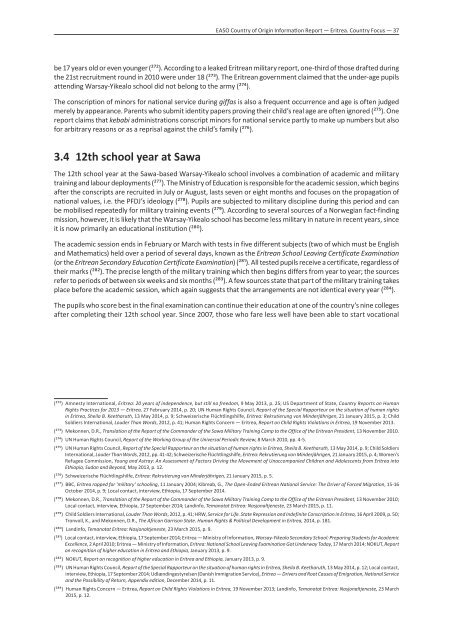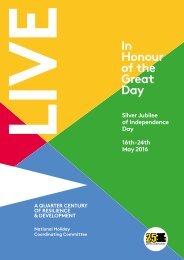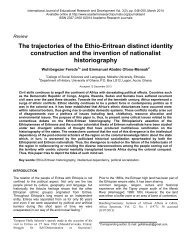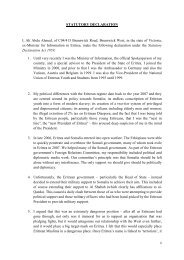Create successful ePaper yourself
Turn your PDF publications into a flip-book with our unique Google optimized e-Paper software.
EASO Country of Origin Information <strong>Report</strong> — <strong>Eritrea</strong>. Country Focus — 37<br />
be 17 years old or even younger (272). According to a leaked <strong>Eritrea</strong>n military report, one-third of those drafted during<br />
the 21st recruitment round in 2010 were under 18 (273). The <strong>Eritrea</strong>n government claimed that the under-age pupils<br />
attending Warsay-Yikealo school did not belong to the army (274).<br />
The conscription of minors for national service during giffas is also a frequent occurrence and age is often judged<br />
merely by appearance. Parents who submit identity papers proving their child’s real age are often ignored (275). One<br />
report claims that kebabi administrations conscript minors for national service partly to make up numbers but also<br />
for arbitrary reasons or as a reprisal against the child’s family (276).<br />
3.4 12th school year at Sawa<br />
The 12th school year at the Sawa-based Warsay-Yikealo school involves a combination of academic and military<br />
training and labour deployments (277). The Ministry of Education is responsible for the academic session, which begins<br />
after the conscripts are recruited in July or August, lasts seven or eight months and focuses on the propagation of<br />
national values, i.e. the PFDJ’s ideology (278). Pupils are subjected to military discipline during this period and can<br />
be mobilised repeatedly for military training events (279). According to several sources of a Norwegian fact-finding<br />
mission, however, it is likely that the Warsay-Yikealo school has become less military in nature in recent years, since<br />
it is now primarily an educational institution (280).<br />
The academic session ends in February or March with tests in five different subjects (two of which must be English<br />
and Mathematics) held over a period of several days, known as the <strong>Eritrea</strong>n School Leaving Certificate Examination<br />
(or the <strong>Eritrea</strong>n Secondary Education Certificate Examination) (281). All tested pupils receive a certificate, regardless of<br />
their marks (282). The precise length of the military training which then begins differs from year to year; the sources<br />
refer to periods of between six weeks and six months (283). A few sources state that part of the military training takes<br />
place before the academic session, which again suggests that the arrangements are not identical every year (284).<br />
The pupils who score best in the final examination can continue their education at one of the country’s nine colleges<br />
after completing their 12th school year. Since 2007, those who fare less well have been able to start vocational<br />
(272) Amnesty International, <strong>Eritrea</strong>: 20 years of independence, but still no freedom, 9 May 2013, p. 25; US Department of State, Country <strong>Report</strong>s on Human<br />
Rights Practices for 2013 — <strong>Eritrea</strong>, 27 February 2014, p. 20; UN Human Rights Council, <strong>Report</strong> of the Special Rapporteur on the situation of human rights<br />
in <strong>Eritrea</strong>, Sheila B. Keetharuth, 13 May 2014, p. 9; Schweizerische Flüchtlingshilfe, <strong>Eritrea</strong>: Rekrutierung von Minderjährigen, 21 January 2015, p. 3; Child<br />
Soldiers International, Louder Than Words, 2012, p. 41; Human Rights Concern — <strong>Eritrea</strong>, <strong>Report</strong> on Child Rights Violations in <strong>Eritrea</strong>, 19 November 2013.<br />
(273) Mekonnen, D.R., Translation of the <strong>Report</strong> of the Commander of the Sawa Military Training Camp to the Office of the <strong>Eritrea</strong>n President, 13 November 2010.<br />
(274) UN Human Rights Council, <strong>Report</strong> of the Working Group of the Universal Periodic Review, 8 March 2010, pp. 4-5.<br />
(275) UN Human Rights Council, <strong>Report</strong> of the Special Rapporteur on the situation of human rights in <strong>Eritrea</strong>, Sheila B. Keetharuth, 13 May 2014, p. 9; Child Soldiers<br />
International, Louder Than Words, 2012, pp. 41-42; Schweizerische Flüchtlingshilfe, <strong>Eritrea</strong>: Rekrutierung von Minderjährigen, 21 January 2015, p. 4; Women’s<br />
Refugee Commission, Young and Astray: An Assessment of Factors Driving the Movement of Unaccompanied Children and Adolescents from <strong>Eritrea</strong> into<br />
Ethiopia, Sudan and Beyond, May 2013, p. 12.<br />
(276) Schweizerische Flüchtlingshilfe, <strong>Eritrea</strong>: Rekrutierung von Minderjährigen, 21 January 2015, p. 5.<br />
(277) BBC, <strong>Eritrea</strong> rapped for ‘military’ schooling, 11 January 2004; Kibreab, G., The Open-Ended <strong>Eritrea</strong>n National Service: The Driver of Forced Migration, 15-16<br />
October 2014, p. 9; Local contact, interview, Ethiopia, 17 September 2014.<br />
(278) Mekonnen, D.R., Translation of the <strong>Report</strong> of the Commander of the Sawa Military Training Camp to the Office of the <strong>Eritrea</strong>n President, 13 November 2010;<br />
Local contact, interview, Ethiopia, 17 September 2014; Landinfo, Temanotat <strong>Eritrea</strong>: Nasjonaltjeneste, 23 March 2015, p. 11.<br />
(279) Child Soldiers International, Louder Than Words, 2012, p. 41; HRW, Service for Life. State Repression and Indefinite Conscription in <strong>Eritrea</strong>, 16 April 2009, p. 50;<br />
Tronvoll, K., and Mekonnen, D.R., The African Garrison State. Human Rights & Political Development in <strong>Eritrea</strong>, 2014, p. 181.<br />
(280) Landinfo, Temanotat <strong>Eritrea</strong>: Nasjonaltjeneste, 23 March 2015, p. 9.<br />
(281) Local contact, interview, Ethiopia, 17 September 2014; <strong>Eritrea</strong> — Ministry of Information, Warsay-Yikealo Secondary School: Preparing Students for Academic<br />
Excellence, 2 April 2010; <strong>Eritrea</strong> — Ministry of Information, <strong>Eritrea</strong>: National School Leaving Examination Got Underway Today, 17 March 2014; NOKUT, <strong>Report</strong><br />
on recognition of higher education in <strong>Eritrea</strong> and Ethiopia, January 2013, p. 9.<br />
(282) NOKUT, <strong>Report</strong> on recognition of higher education in <strong>Eritrea</strong> and Ethiopia, January 2013, p. 9.<br />
(283) UN Human Rights Council, <strong>Report</strong> of the Special Rapporteur on the situation of human rights in <strong>Eritrea</strong>, Sheila B. Keetharuth, 13 May 2014, p. 12; Local contact,<br />
interview, Ethiopia, 17 September 2014; Udlændingestyrelsen (Danish Immigration Service), <strong>Eritrea</strong> — Drivers and Root Causes of Emigration, National Service<br />
and the Possibility of Return, Appendix edition, December 2014, p. 11.<br />
(284) Human Rights Concern — <strong>Eritrea</strong>, <strong>Report</strong> on Child Rights Violations in <strong>Eritrea</strong>, 19 November 2013; Landinfo, Temanotat <strong>Eritrea</strong>: Nasjonaltjeneste, 23 March<br />
2015, p. 12.






